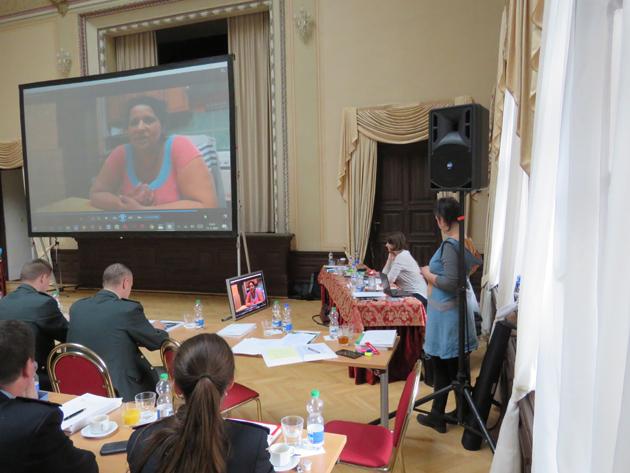Czech survey finds 45 % of Romani ghetto residents don't trust police, 42 % do

Roughly 45 % of the Romani residents of the so-called excluded localities do not trust the Czech Police. Two-thirds of those surveyed believe police officers have prejudices against Romani people.
Those are the findings of a survey conducted among roughly 4 450 Romani people from localities around the entire country, produced for the Czech Police by the Augur Consulting agency. Police specialists on working with the Romani minority are now meant to be improving the situation in the ghettos and contributing to their better coexistence with those living in surrounding areas.
In four regions of the Czech Republic there are now a total of 40 such specialists deployed. The project was presented by Czech Police representatives at a press conference earlier this month.
The number of so-called excluded localities in the Czech Republic is growing. While in 2006, according to expert analyses, there were around 300 such impoverished locales housing approximately 80 000 people, in 2015 that number was reported as being 606 locations with 115 000 residents.
Most of the people living in such places are Romani. The adults are mostly jobless and their children frequently end up attending “special schools”.
Romani ghetto residents have less faith in the Czech Police than other inhabitants of the country do. While 45 % of Romani ghetto residents do not trust police officers, 42.3 % of those surveyed said they do trust them.
According to the authors of the survey, about three-fifths of the non-Romani inhabitants of the Czech Republic have faith in the police, a higher proportion than that of Romani people living in social exclusion. “The police are trusted by 42.3 % of the Romani respondents, which is no small number. For police in the past it has been very difficult to get information in the localities and win people’s trust there. Today almost 60 % of Romani people surveyed say they want police officers to come to their localities and communicate with them,” Martin Hrinko, Director of the Police Force Services at the Police Presidium, said at the press conference.
Almost half of the Romani women living in ghettos trust the police, compared to 37 % of the Romani men. Police are more trusted by people age 65 and over and by residents of localities in the Moravian-Silesian Region, the Pardubice Region, and Prague, while Romani youth and residents of the Liberec, South Bohemian, Ústecký and Zlín Regions trust police less.
If police officers aided a respondent with something in the past, then the respondent’s faith in the police was higher than average. If a respondent had to address committing a misdemeanor with police, or had other difficulties with them, then respondent reported less faith in them.
According to 67 % of respondents, police do not believe what Romani people say. Just 12 % of the respondents said that they believed police do take Roma seriously.
One-fifth of the respondents were unable to say how they think police approach Romani residents. However, a total of 57 % of the Romani people surveyed said they believe police behave worse towards Roma than they do toward non-Romani people.
One-quarter of those surveyed disagreed that police treat Romani people worse. Two-thirds of respondents also said police officers have prejudices against Romani people.
Romani people from big city localities were most frequently convinced of that, with almost three-quarters of such respondents reporting anti-Romani prejudice among police. In rural localities, 58 % of the Romani residents were of that opinion.
Prejudices among police officers were reportedly not observed by 14 % of the Romani people surveyed. “Police officers just reflect the situation in society. It is important that each police officer comprehend that he or she must contribute to promoting a non-discriminatory approach and protecting human rights,” said Mirjam Karoly of the Contact Point for Roma and Sinti at the Organization for Security and Cooperation in Europe.
Czech Police specialists for working with minorities are meant to better coexistence between ghetto residents and inhabitans of the surrounding areas, improve the situation inside the localities themselves, and lower crime rates. Of the five female police officers and 35 male police officers currently deployed as specialists, four are Romani.
There are 10 specialists in each of the four regions involved in the project. According to project manager Václav Vlček, another 20 such officers in two new regions should join them from the rank-and-file police services over the next year.
The specialists should remain in the regions for at least the next five years. The pilot project began in the autumn of 2014 and ends this month.
The project cost CZK 16.5 million [EUR 614 000], four-fifths of which was provided by Norway Grants and one-fifth of which was covered by the police budget. The training also included 14 contact officers for minorities, one for each region, and 10 high-ranking police managers.
